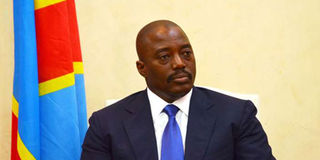DR Congo bans marches over delayed polls

Democratic Republic of Congo President Joseph Kabila. He extended his stay in office. PHOTO | AFP
What you need to know:
The pro-Kabila Presidential Majority coalition of parties had planned a march on Tuesday to voice support for the delayed elections.
The opposition coalition had planned an anti-Kabila march the same day but deferred its protest until Thursday.
The head of the opposition coalition, Felix Tshisekedi, said he would not heed the ban. "There's no question of depriving us of our rights and freedom," he tweeted.
KINSHASA,
The Democratic Republic of Congo on Sunday banned rallies due this week in the capital Kinshasa over the extended rule of President Joseph Kabila despite global concern over a crackdown.
Mineral-rich but chronically poor, politically unstable and saddled with a reputation for entrenched corruption, DR Congo is facing the risk of a flare-up of violence over Kabila's decision to stay in office.
DEMOS
He was scheduled to have stepped down in December this year after a constitutional maximum of two terms in office.
Pressured by the international community, DR Congo has now scheduled the vote for December 23, 2018.
Authorities in the capital Kinshasa said all planned demonstrations this week were banned, in a statement carried on websites.
The pro-Kabila Presidential Majority coalition of parties had planned a march on Tuesday to voice support for the delayed elections.
The opposition coalition had planned an anti-Kabila march the same day but deferred its protest until Thursday.
The head of the opposition coalition, Felix Tshisekedi, said he would not heed the ban. "There's no question of depriving us of our rights and freedom," he tweeted.
53 DEAD
"I call on all Congolese to massively participate in the march of November 30, 2017."
Congolese authorities made arrests ahead of an opposition march on November 15, sparking concern from the United States, Switzerland and Canada about limits on the freedom of expression.
"Rather than seeking to ban and disrupt these meetings, the Congolese government could work with civil society and the representatives of the opposition to ensure that such events can be held in all security and without incident," a joint statement said.
According to a report this month by the respected National Episcopal Conference of the Congo (CENCO), police and security forces killed at least 53 anti-government protesters between April and October.
Fifty-two people were shot dead and one other died from tear gas over the sixth month period, according to 200 observers who monitored the protests for CENCO. Three police officers were killed by demonstrators.
6 ARMIES
Two decades ago DR Congo collapsed into the deadliest conflict in modern African history.
Its two wars in the late 1990s and early 2000s dragged in at least six African armies and left more than three million dead.
The east of the country remains a battleground for rival ethnic militias.
Kabila took office after his father Laurent was assassinated in 2001 at the height of the Second Congo War.
He was confirmed as leader in 2006 during the first free elections since independence, and re-elected for a second term in 2011 in a vote marred by accusations of fraud.





